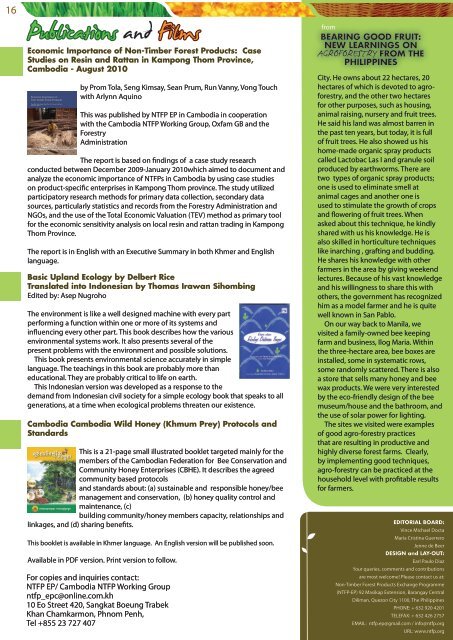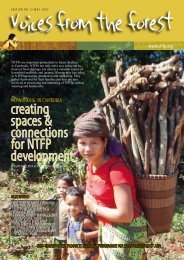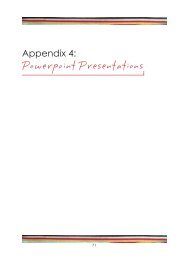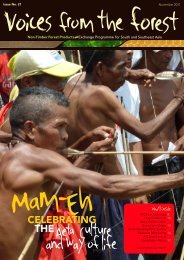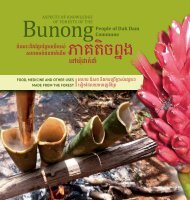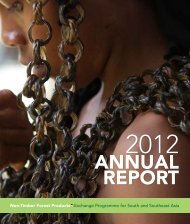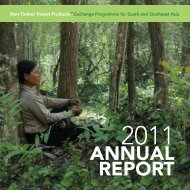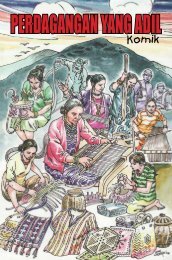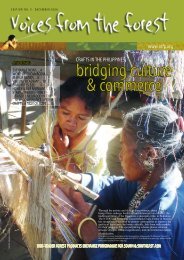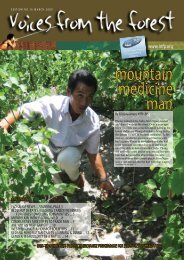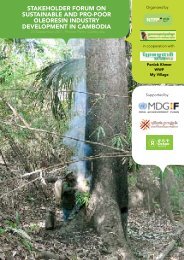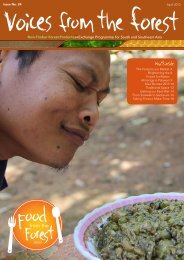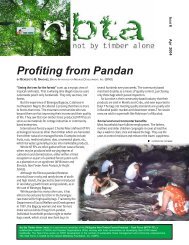Edition No. 20 - Non-Timber Forest Products Exchange Programme
Edition No. 20 - Non-Timber Forest Products Exchange Programme
Edition No. 20 - Non-Timber Forest Products Exchange Programme
You also want an ePaper? Increase the reach of your titles
YUMPU automatically turns print PDFs into web optimized ePapers that Google loves.
16<br />
Publications and Films<br />
Economic Importance of <strong>No</strong>n-<strong>Timber</strong> <strong>Forest</strong> <strong>Products</strong>: Case<br />
Studies on Resin and Rattan in Kampong Thom Province,<br />
Cambodia - August <strong>20</strong>10<br />
by Prom Tola, Seng Kimsay, Sean Prum, Run Vanny, Vong Touch<br />
with Arlynn Aquino<br />
This was published by NTFP EP in Cambodia in cooperation<br />
with the Cambodia NTFP Working Group, Oxfam GB and the<br />
<strong>Forest</strong>ry<br />
Administration<br />
The report is based on findings of a case study research<br />
conducted between December <strong>20</strong>09-January <strong>20</strong>10which aimed to document and<br />
analyze the economic importance of NTFPs in Cambodia by using case studies<br />
on product-specific enterprises in Kampong Thom province. The study utilized<br />
participatory research methods for primary data collection, secondary data<br />
sources, particularly statistics and records from the <strong>Forest</strong>ry Administration and<br />
NGOs, and the use of the Total Economic Valuation (TEV) method as primary tool<br />
for the economic sensitivity analysis on local resin and rattan trading in Kampong<br />
Thom Province.<br />
The report is in English with an Executive Summary in both Khmer and English<br />
language.<br />
Basic Upland Ecology by Delbert Rice<br />
Translated into Indonesian by Thomas Irawan Sihombing<br />
Edited by: Asep Nugroho<br />
The environment is like a well designed machine with every part<br />
performing a function within one or more of its systems and<br />
influencing every other part. This book describes how the various<br />
environmental systems work. It also presents several of the<br />
present problems with the environment and possible solutions.<br />
This book presents environmental science accurately in simple<br />
language. The teachings in this book are probably more than<br />
educational. They are probably critical to life on earth.<br />
This Indonesian version was developed as a response to the<br />
demand from Indonesian civil society for a simple ecology book that speaks to all<br />
generations, at a time when ecological problems threaten our existence.<br />
Cambodia Cambodia Wild Honey (Khmum Prey) Protocols and<br />
Standards<br />
This is a 21-page small illustrated booklet targeted mainly for the<br />
members of the Cambodian Federation for Bee Conservation and<br />
Community Honey Enterprises (CBHE). It describes the agreed<br />
community based protocols<br />
and standards about: (a) sustainable and responsible honey/bee<br />
management and conservation, (b) honey quality control and<br />
maintenance, (c)<br />
building community/honey members capacity, relationships and<br />
linkages, and (d) sharing benefits.<br />
This booklet is available in Khmer language. An English version will be published soon.<br />
Available in PDF version. Print version to follow.<br />
For copies and inquiries contact:<br />
NTFP EP/ Cambodia NTFP Working Group<br />
ntfp_epc@online.com.kh<br />
10 Eo Street 4<strong>20</strong>, Sangkat Boeung Trabek<br />
Khan Chamkarmon, Phnom Penh,<br />
Tel +855 23 727 407<br />
from<br />
BEARING GOOD FRUIT:<br />
NEW LEARNINGS ON<br />
FROM THE<br />
PHILIPPINES<br />
AGROFORESTRY<br />
City. He owns about 22 hectares, <strong>20</strong><br />
hectares of which is devoted to agroforestry,<br />
and the other two hectares<br />
for other purposes, such as housing,<br />
animal raising, nursery and fruit trees.<br />
He said his land was almost barren in<br />
the past ten years, but today, it is full<br />
of fruit trees. He also showed us his<br />
home-made organic spray products<br />
called Lactobac Las I and granule soil<br />
produced by earthworms. There are<br />
two types of organic spray products;<br />
one is used to eliminate smell at<br />
animal cages and another one is<br />
used to stimulate the growth of crops<br />
and flowering of fruit trees. When<br />
asked about this technique, he kindly<br />
shared with us his knowledge. He is<br />
also skilled in horticulture techniques<br />
like inarching , grafting and budding.<br />
He shares his knowledge with other<br />
farmers in the area by giving weekend<br />
lectures. Because of his vast knowledge<br />
and his willingness to share this with<br />
others, the government has recognized<br />
him as a model farmer and he is quite<br />
well known in San Pablo.<br />
On our way back to Manila, we<br />
visited a family-owned bee keeping<br />
farm and business, Ilog Maria. Within<br />
the three-hectare area, bee boxes are<br />
installed, some in systematic rows,<br />
some randomly scattered. There is also<br />
a store that sells many honey and bee<br />
wax products. We were very interested<br />
by the eco-friendly design of the bee<br />
museum/house and the bathroom, and<br />
the use of solar power for lighting.<br />
The sites we visited were examples<br />
of good agro-forestry practices<br />
that are resulting in productive and<br />
highly diverse forest farms. Clearly,<br />
by implementing good techniques,<br />
agro-forestry can be practiced at the<br />
household level with profitable results<br />
for farmers.<br />
EDITORIAL BOARD:<br />
Vince Michael Docta<br />
Maria Cristina Guerrero<br />
Jenne de Beer<br />
DESIGN and LAY-OUT:<br />
Earl Paulo Diaz<br />
Your queries, comments and contributions<br />
are most welcome! Please contact us at:<br />
<strong>No</strong>n-<strong>Timber</strong> <strong>Forest</strong> <strong>Products</strong> <strong>Exchange</strong> <strong>Programme</strong><br />
(NTFP-EP) 92 Masikap Extension, Barangay Central<br />
Diliman, Quezon City 1100, The Philippines<br />
PHONE: + 632 9<strong>20</strong> 4<strong>20</strong>1<br />
TELEFAX: + 632 426 2757<br />
EMAIL: ntfp.ep@gmail.com / info@ntfp.org<br />
URL: www.ntfp.org


